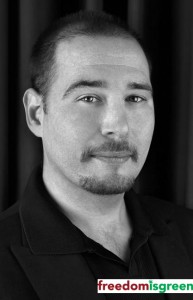President Reagan meets Jonathan Magbie. At 27 years old, Jonathan would die on the floor of a Washington DC city jail. In 2004 he was arrested for smoking a marijuana blunt to ease the pain he endured as a quadriplegic. photo
6/17/2011 by Chris Goldstein – When President Nixon signed an Executive Order on June 17, 1971 it sent the United States down a costly path of prohibition. This misguided effort pits Americans against each other in a never-ending battle of biology, psychology and human nature. The result has been a nuclear reactor of violence and deadly addiction.
The “War on Drugs” is not a slogan. Ask any Police Officer. Ask anyone who lives in Trenton, Philadelphia or Camden. This is a pitched battle right in our streets and in our homes. Thousands have lost their lives. Millions have gone to prison. Trillions of tax dollars have been spent at every level. There has never been a measurable result, only more victims.
I have seen many levels of this war in person. In high school my Quaker group helped tutor middle-school students in Camden. Spending time in the neighborhoods over the years brought the open air drug trade into quick focus. Then in the late 1990′s I was employed on a contract to test various housing projects in Philadelphia for lead paint. Armed with a computer pack and an x-ray gun we walked through thousands of occupied units in high rises and row homes. This is the no man’s land, communities that have been obliterated by the constant shelling.
For the last decade I have been working on marijuana law reform because it is the key to solving the drug war problem. Cannabis chalks up more arrests every year in the US than for all other drugs combined. The irony is that it was not supposed to be included under criminal prohibitions at all.
When President Nixon made that devastating order in 1971 marijuana was classified with drugs like cocaine as a temporary measure. Nixon tapped a fellow Republican who had just stepped down as Pennsylvania governor to find out how cannabis should be treated. Raymond P. Shafer led The National Commission on Marihuana and Drug Abuse.
This team of sociologists, psychologists, physicians, lawmakers and policy experts toured the country to conduct careful research and observations. Shafer then led the effort to craft the strikingly candid final report: “Marihuana: A Signal of Misunderstanding.” The conclusion was that cannabis should not remain in the narcotic drugs scheme. The Commission went further, recommending that personal possession of cannabis – even transfer for no remuneration – should be decriminalized.
If President Nixon had followed that careful advice we would have never fought a war against marijuana. Instead we would have eventually regulated the cannabis markets for recreation and medication. Hemp farming would be a valuable part of our agricultural economy and sustainable products. But Nixon was not pleased with the Commissions’ assessments and chose to leave them out of policy.
The “War on Drugs” is not a slogan. It is fought with laws, bullets, money, prison cells and human beings. It is fought in front of us every day. And it can stop. A real truce is to begin treating serious drug addiction as a public health problem. In order to pay for that treatment and research we need to legalize marijuana.
But this also brings up the bigger picture: Ending marijuana prohibition and signing a final armistice for the drug war could swiftly jumpstart the national economy – at a time when we need it the most. The tremendous influx of tax revenue from cannabis is already being realized in some places through medical marijuana. This is where the missing jobs could be found, in the millions.
Ending the drug war is the most important social justice and economic policy change we need to make today. After 40 years of failure it is time to try something new.
Chris Goldstein is a respected marijuana reform advocate. As a writer and radio broadcaster he has been covering cannabis news for over a decade. Questions? [email protected]